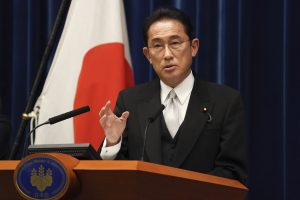The Japanese Diet recently elected longtime top diplomat Kishida Fumio as the country’s next prime minister. While a seasoned negotiator with both Pyongyang and Seoul, Prime Minister Kishida will likely maintain a typical Japanese approach toward the two Koreas.
Kishida follows a common political path in Japan in approaching the two Koreas: seek apology and clarity from Pyongyang on the abduction issue while refusing to offer additional apologies to Seoul for war crimes. During his tenure as foreign affairs minister from late 2012 to 2017, Kishida negotiated with Pyongyang alongside both conservative and liberal U.S. and South Korean administrations. Under U.S. President Barack Obama and South Korean President Park Geun-hye, Kishida supported a hardline approach to North Korean human rights issues and nuclear proliferation, highlighting that “Japan would not be able to normalize diplomatic relations with North Korea” without first resolving the abduction issue.
During the 1970s to the 1980s, North Korea abducted large numbers of foreign nationals, including Japanese citizens, for an intelligence program aimed at preparing North Korean spies to infiltrate foreign governments through forced foreign language instruction. Kishida attempted to resolve this issue during a meeting with then-North Korean Minister of Foreign Affairs Ri Su Yong in 2015, but it remains a major unattained foreign policy goal for Tokyo.
Under the Trump and Moon administrations, Kishida expressed support for an “action for action” approach toward Pyongyang, which supported the position of Washington but conflicted with Seoul’s hyper engagement policy with North Korea. Although the Biden administration has attempted to contact Pyongyang to prevent further escalation, both Washington and Tokyo will likely maintain a hardline approach toward North Korean military provocations and human rights abuses. Kishida stated in 2017 that the abduction issue continues to be the “most important” issue related to Japan-North Korea negotiations, signaling an intent to maintain Tokyo’s typical political stance.
In South Korea, Kishida is most known for his role in brokering the 2015 “Comfort Women Agreement” between Tokyo and Seoul, which continues to stymie positive developments in Japan-South Korea relations. While the agreement confirmed that the “Government of Japan will now take measures to heal psychological wounds of all former comfort women” through financial compensation, Seoul failed to consult the “comfort women” before agreeing to its terms, generating mass outcry from South Korean citizens, including the survivors themselves. Current South Korean President Moon Jae-in mentioned his disapproval of the agreement during his 2017 presidential campaign, a sentiment he has continued to express throughout his presidency and one that Japan strongly rejects.
Controversy around wartime issues had direct political and economic impacts. Japan imposed tighter export controls on certain materials to South Korea while stripping its fast-export status in response to the South Korean Supreme Court ruling that Japanese companies should compensate South Koreans forcibly conscripted to work for Imperial Japan during World War II. While concerns regarding intellectual property and economic competition fueled the China-U.S. trade war, Seoul and Tokyo deliberately frayed their economic partnership for mostly humanitarian and political reasons.
Just last month, Kishida implied during a party presidential candidate debate that if Seoul doesn’t abide by the previous terms, there is no path forward for Japan-South Korea relations. This suggest that he will likely maintain the existing position of the Japanese government to deny further accountability for its past war crimes, while arguing that South Korea must devise its own solution to domestic disputes over the “comfort women” issue.
While Japan-U.S. relations under Kishida will likely strengthen, Tokyo will continue to struggle with issues pertaining to the two Koreas. As regime change in North Korea is highly unlikely, Tokyo’s best chance at improving its relationship with at least one of the two Koreas depends on the results of the March 2022 South Korean presidential elections. If the conservative opposition party wins the vote, Seoul will likely pursue a softening of tensions with Tokyo, which may offer an opportunity for growth. However, the “comfort women” issue will remain a major sticking point for positive diplomatic developments. Although Seoul has expressed its intent to cooperate with the new Japanese government, it is unlikely that any major political breakthroughs will occur during while Kishida and Moon preside over Japan-South Korea relations.
































